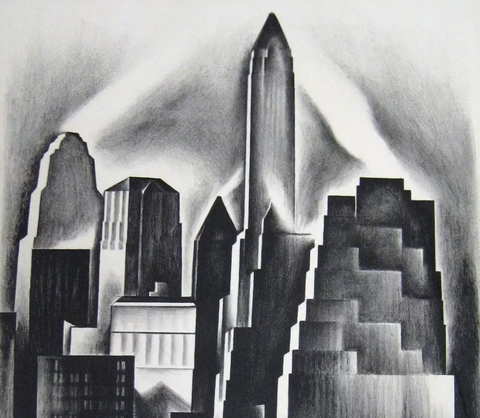01.04.2022
New Publication | Manhattan Heat Transfer: Energy and the Climate Unconscious in Modernist Visions of the American Metropolis (American Studies 60 3/4)
Manhattan Heat Transfer: Energy and the Climate Unconscious in Modernist Visions of the American Metropolis
This article examines the mechanisms by which modernist energy aesthetics displace the representation of climate and atmospheric pollution in visions of the American metropolis around 1930. Offering a reading of William Gibson’s “The Gernsback Continuum” and John Dos Passos’ Manhattan Transfer, and drawing on examples from art and architecture, I illustrate how the futurist imaginary of the early twentieth century hides climate and energy entanglements in plain sight. Tracing the modern energy unconscious to the transition from steam to electricity and related practices in buildings design and infrastructural concealment, I am interested in the ways in which modernism produces an intense engagement with energy while simultaneously repressing its modes of production and ecological ramifications. I use Gibson’s short story for its retrospective critique of the irrational energy regime of Golden Age science fiction in the lineage of petromodernist architecture and industrial design. As an articulation of American modernism, produced at the same time as the aesthetics of Gernsback SF and futurist design, Manhattan Transfer is subsequently examined as a negotiation of what it means to situate the abstract notion of climate in the lived materiality of modern city life. Building on recent work in the energy humanities, I propose that it is precisely in its visceral invocations of energy dissipation—or heat transfer—in relation to the aesthetics of fossil fuel that Dos Passos’ novel re-attaches climate and atmospheres to the places of its production and material embodiment. This is what I call the novel’s climate unconscious.
Reference:
Ingwersen, M. (2022). Manhattan Heat Transfer: Energy and the Climate Unconscious in Modernist Visions of the American Metropolis. American Studies, 60 (3/4). Special Issue "Our Shared Planet." 89-108

